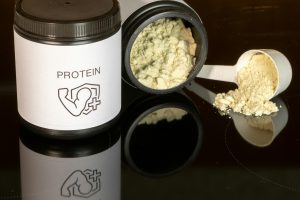Every athlete who is injured and facing surgery should know which supplements help athletes recover from surgery. Common sports injuries that require surgery include the knee, groin, shoulder, or hip. For all of these surgeries, muscle and strength loss is the main concern as it prolongs the athlete’s rehab and return to sport.
Every athlete needs to know that some dietary supplements help athletes recover from surgery and reduce muscle loss during periods of immobilization. The most effective and well-tested supplements are vitamin D, protein, and HMB to help surgery recovery.
Key supplements that help athletes recover from surgery:
- Protein
- Vitamin D
- HMB
Other popular supplements with emerging evidence or mixed results for recovery after surgery include:
- Creatine
- Fish oil Supplementation
- Prebiotics and Probiotics
- Multivitamin
How To Optimize Surgery Recovery
If you are going in for an ACL surgery, the key concerns from surgery are losing muscle mass and strength. Athletes start to lose muscle within 36 hours of immobilization or inactivity. After surgery, inflammation continues to break down muscles and impair strength.
Every athlete can speed up healing and recovery from surgery by focusing on these three main goals:
- Avoid postoperative complications.
- Early recovery using rehab exercises and nutrition.
- Return to play as soon as it is safely possible.
Are your Supplements Clean for Sport?
Competing athletes should choose supplement brands that have undergone third-party testing to verify their contents and ensure the absence of banned substances. The most common certification programs for identifying evidence-based supplements are NSF International, Banned Substances Control Group, Informed Choice, and Informed Sport.
1. Supplement to Help Athletes Recovery after Surgery: Protein Powder
Protein powder is an easy way to get enough protein during recovery. Add a little extra protein to help with tissue repair, inflammation, and healing after surgery.
Aim for 1.5 – 2.0 grams of protein per kg body weight per day.
Athletes should include protein in each meal and snack to minimize loss of muscle and strength after surgery. This is because the body cannot use large amounts of protein at once and needs a steady stream of protein throughout the day to build muscle.
Have 25-30 grams of protein at 4-5 meals or snacks per day.
It is always best to get your nutrients from real food, but sometimes a protein powder creates a stronger anabolic effect compared to relying solely on dietary protein. The highest quality proteins have a complete profile of all the amino acids including essential amino acids and leucine content, which are pivotal in promoting muscle protein synthesis.
Should athletes use protein powder for recovery after surgery?
Athletes should aim for their daily protein requirements both before and after surgery, with the help of protein shakes if needed. Whether you add protein powder to an oatmeal breakfast, or you have it as a bedtime snack, it can help prevent muscle loss before surgery and during recovery. In fact, a 2021 review paper recommends having protein powder or essential amino acids can be helpful to conserve muscle in the hours before and after a surgery, when food cannot be consumed.
Want to know about the latest research on bedtime snacks? Check out our blog post answering, “Are bedtime snacks ok for young athletes?”
What protein powder should athletes use?
Both whey and casein proteins stimulate greater amino acid uptake and net protein synthesis, compared to soy-based proteins. Whey protein is the highest-quality protein source, with more than 50% of the amino acid composition coming from EAAs and 2.7 g of leucine in one scoop. Plant-based protein powders offer a broad nutrition profile; however, they have a lower content of essential amino acids and leucine. Increasing the quantity of plant protein consumed has the potential to enhance the anabolic effectiveness of plant-based products. The most common sources of plant-based protein supplements include soy, pea, and blends containing hemp, pumpkin seed, and rice protein. For more information on amounts of protein from foods and different protein powders, see this blog: How Much Protein Do Young Athletes Need?
2. Supplement to Help Athletes Recovery after Surgery: Vitamin D
Beyond its basic role in bone health, there is a strong correlation between vitamin D levels and optimal muscle function. Vitamin D acts as a hormone in the body, optimizing immune function, muscle function, protein synthesis, exercise capacity, and even athletic performance.
There is strong evidence that low vitamin D levels impair muscle repair and regeneration. A scientific review shows that low vitamin D levels have adverse outcomes on surgical recovery and delay recovery from knee surgery. Moreover, taking a daily 1000 IU vitamin D supplement reduces inflammation, pain, and myopathy, speeds up wound healing, shortens the immobilization period, and increases muscle strength.
What is an optimal Vitamin D level in the blood for athletes?
Research on athletes and Vitamin D levels found a level of 100 nmol/L is required for fracture prevention, including stress fractures.
 What if my Vitamin D level is low?
What if my Vitamin D level is low?
For athletes who have a low level of vitamin D, a 2023 study recommends that doses of 4000-5000 IU are most effective in correcting insufficient vitamin D status. This is in line with recommendations made for athletes in the 2013 Nutrients Journal.
Athletes with low vitamin D levels should take 4000-5000IU vitamin D for 2-3 months.
However, the first study to compare a preoperative vitamin D loading dose regimen of 50,000 IU weekly for 4 weeks, to a daily moderate dose of 1000 to 6000 IU among total knee arthroplasty patients. The loading dose of 50,000 IU per week for 4 weeks is more effective at raising low vitamin D levels in a short time before surgery.
What if my Vitamin D levels are OK?
Athletes should take 2000IU vitamin D daily in the winter months to maintain optimal levels of 100 nmol/L.
Several recent studies have concluded that daily supplementation of 1000 IU of vitamin D is not enough to maintain an optimal status of 100 nmol/L throughout the winter months. A Dutch study compared athletes who took a daily supplement of either 400IU, 1100IU, or 2200IU vitamin D for a year. Another study by Holick et al. found that doses of at least 1500–2000 IU/day are required to raise the blood level of vitamin D above 75 nmol/L.
3. Supplement to Help Athletes Recovery after Surgery: HMB
Why is HMB a good supplement to help athletes recover from surgery?
Beta-hydroxy-beta-methyl butyrate, or HMB for short, is a chemical produced by the body when breaking down the amino acid, leucine. Leucine has been known as a powerful nutritional supplement for increasing muscle strength and muscle mass when combined with exercise. A 2017 review of HMB supplementation concludes that it is especially helpful during stressful physiological situations, such as injury or high physical stress. In short, HMB supplementation helps in two ways:
- It ‘upregulates’ protein synthesis, so it helps build muscle using protein
- It slows the rate of muscle protein breakdown.
Studies have found that HMB prevents muscle wasting in the elderly on bed rest, so it is theorized that HMB supplements may preserve muscle mass pre-operative and immobilize after surgery. HMB helps to build muscle mass when combined with therapy in the rehab stage after surgery and a period of inactivity. Although HMB is commonly found in the diet, our typical dietary intake ranges from 0.25 to 1 g daily. Supplemental intakes of 3 g daily divided into two 1.5-g doses have shown the most effective results for muscle maintenance.
Taking 1.5 grams of HMB twice a day helps to preserve muscle mass, and strength during injury, when immobilized, or when returning to training.
No side effects have been reported with HMB; thus, the potential benefits are likely to be high and the risk minimal. ISSN has advised that chronic consumption of HMB is safe. Athletes are responsible for ensuring any supplements they ingest have undergone third-party testing to verify their contents and ensure the absence of contaminants.
4. Creatine
What is creatine and how does it help performance?
Creatine is a cluster of 3 amino acids (arginine, glycine, and methionine) that is made in small amounts in the body. We store 95% of our creatine in our skeletal muscles. The purpose of creatine is to help with energy production, especially during high-intensity exercise, such as heavy lifting or sprints. In addition to naturally occurring creatine, we can also get creatine from consuming animal protein (meat, poultry, fish). There is a large body of evidence that creatine supplements can improve high-intensity performance and enhance muscle mass strength and gains when combined with exercise. Creatine is one of the most researched legal supplements available to athletes.
Does creatine play a role in recovery after surgery?
A 2022 review concluded that there’s limited evidence to support that creatine improves muscle mass or strength after surgery. Several randomized control trials in 2005 and 2004 evaluating creatine supplementation after surgery found insignificant improvements when comparing the findings between the creatine group and placebo group.
However, creatine supplements may protect help athletes protect muscle mass and strength, during limb immobilization. Many injuries and surgeries result in a period of immobilization, which leads to loss of muscle mass. One study showed that 20g creatine supplementation (4x 5g) for 2 weeks helped retain muscle strength, mass, and endurance in young men with their arms in a sling.
Should athletes take Creatine to help with their recovery after surgery?
Creatine is safe and it may help protect your muscle mass and strength if you are in a cast, sling, or otherwise immobilized post-injury.
For more information on the safety, efficacy, and doses of creatine in kids, see this blog: Is Creatine Safe for Kids?
5. Prebiotics and Probiotics
A diverse healthy gut microbiome is essential to our overall health as roughly 70% of the immune system is in the gut. If we have a diverse healthy gut microbiome with good bacteria, we will likely have a strong immune system. After surgery, it is common for patients to take antibiotics to treat or prevent infection. Antibiotics kill both the good and bad bacteria in the gut and change your microbiome. When we lose our good bacteria our gut health suffers and impacts our immune system.
How to improve gut microbiome?
Prebiotics are a group of nutrients found in very high-fibre foods such as fruits, vegetables, and fibre supplements. Prebiotics feed a healthy gut microbiome, producing short-chain fatty acids. They also help with the survival of probiotics in the stomach.
Probiotics are the live ‘‘good’’ bacteria that lead to health benefits in an individual when taken in adequate and consistent amounts. A study found that prebiotics and probiotics given to patients post-surgery reduced postoperative bacterial infections. The same study also demonstrated that the gut microbiome enhanced mucosal immunity thereby reducing the duration of antibiotic therapy. For more tips to boost your gut health and immunity, see my blog on 7 Steps to Build Immunity and Prevent Colds.
6. Omega 3 Fats
Fatty fish like salmon, mackerel, trout, and shellfish including mussels, oysters, and crabs are excellent sources of omega-3 fats DHA and EPA. Unfortunately, plant-based omega 3s like flax seeds are not bioactive, compared to fish oils. Omega-3 fats are essential for many functions including muscle activity, cell growth, and brain development. Omega 3 fatty acids are known for their anti-inflammatory properties. However, during the acute phase of injury or surgery, inflammation is normal and necessary for healing. Therefore, high doses of omega-3 within hours or a few days of injury or surgery may not be helpful.
Should athletes take Omega 3 Fish Oils?
If inflammation is excessive or prolonged, you may consider taking fish oils. Omega-3 fatty acids may increase muscle building and reduce muscle loss in immobilized patients. The Australian Institute of Sport (AIS) recommends a dose of 1-2g daily of fish oils during periods of injury. A dose in this range was effective at increasing the circulating concentration of EPA and DHA during a state of inflammation. Athletes can take up to 1-2 grams of Fish Oil per day with meals, during prolonged injury or inflammation.
Athletes can follow an Anti-inflammatory or Mediterranean-type diet before surgery to reduce overall inflammation.
It may be more effective for athletes to follow an Anti-inflammatory or Mediterranean-type diet before surgery to reduce overall inflammation. This type of diet includes a lot of fruits, vegetables, beans, legumes, fish, eggs, whole grains, white meat, seeds, avocado, olive oil and walnuts. This type of diet shouldn’t be restrictive, rather it should include a wide variety of whole foods and minimize processed foods.
7. Multivitamin
Micronutrients (vitamins and minerals) play an important role in injury recovery and immunity. Certain vitamins, such as vitamins A, C, and E are antioxidants meaning they fight oxidative stress which commonly occurs in the body after injury and surgery. Antioxidants can combat oxidative stress by fighting off free radicals.
In addition, these antioxidants carry out different roles in the body to help recovery after surgery. Vitamin C stimulates collagen synthesis and facilitates wound healing. It’s found in citrus fruits like oranges, grapefruit, and kiwis. Carrots and sweet potatoes are high in vitamin A, which reduces inflammation and enhances cell proliferation. Vitamin E is another antioxidant, which protects the body from free radicals and oxidative stress.
A multivitamin is not helpful if a patient can eat well after surgery.
However, multivitamins do not provide health benefits to people with adequate diets. We get more benefits from nutrients when they come from the whole food, rather than a synthetic supplement. You may consider a multivitamin supplement if you have a hard time eating or are losing weight. However, little information is available on the dose and frequency needed for these supplements to be effective, and taking high doses of vitamins and minerals is not helpful or recommended.
Diet & Supplements that Help Athletes Recover From Surgery
Nutrition and a balanced diet play an essential role in injury and surgery recovery. Supplements rarely have health benefits beyond healthy eating habits like having regular meals that include a variety of fruits, vegetables, lean protein, and whole grains. However, even with a good diet, some supplements can reduce surgical complications, minimize muscle loss, and maximize the prospect of return to play.
Protein and HMB can help maintain lean muscle mass and strength while immobilized pre and post-surgery. Ask for vitamin D before surgery and use a loading dose to optimize vitamin D levels and improve your recovery. In addition, prebiotics and probiotics supplements can enhance gut health and in turn, enhance the immune system.
The evidence for creatine, omega 3, and multivitamins is less clear. Creatine supplementation may play a part in maintaining muscle mass and strength during a period of immobilization which is common before surgery, though there’s limited evidence about the effect of creatine supplementation specifically post-surgery. An anti-inflammatory diet is likely more helpful than fish oils to reduce overall inflammation during injury.
Book a nutrition consultation appointment with Cristina Sutter, RD to optimize your diet during injury, surgery, and recovery.
Article Written by Brianna Gorman, RD, and edited by Cristina Sutter, RD.









